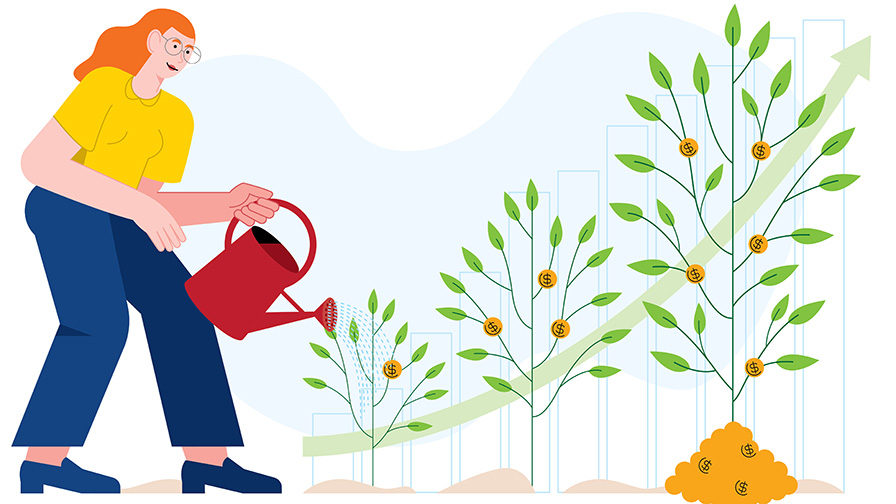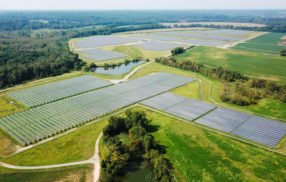
Sustaining Sustainability in the Face of Market Pressures
By Tom van der Voort
Once upon a time, businesses interpreted profit and value to mean the same thing, and both were measured in dollars. Today’s leaders are much more likely to look beyond the direct economic benefits their businesses create to consider social and environmental impacts as well. This broad concept of “sustainability” is now firmly rooted in business thought and increasingly a part of business practice.
But with global economic and market turmoil brewing, advocates could be forgiven for wondering if a recession, or even fears of one, will drive leaders to focus more acutely on financial performance and less on sustainability. Experts from the University of Virginia Darden School of Business community don’t dismiss the concern, but to assess it, they draw a critical distinction between older efforts at “corporate social responsibility” (CSR) and sustainability management.
Whereas the former treats investment in positive social goals as something that’s “nice to have,” says Katherine Neebe (MBA ’04), the chief sustainability officer at Duke Energy, the latter takes a broader view, looking to total value. “There is a business case for doing good, and you need to build that into your value proposition or else you are missing some real risk and some real upside.”
Start at the Top, Take the Long View

Darden Professor Mike Lenox
Professor Mike Lenox, Darden’s chief strategy officer, has been studying sustainability for 30 years. He notes that interest in the environment, in particular, can wax and wane in response to the economy, but over time has taken root.
“It’s part of C-suite discussions at this point. You’d be hard pressed to find a company that isn’t thinking seriously about its footprint, what they can do about it, the risks that are inherent and the opportunities it creates.”
The more sustainability is part of the core business strategy, he says, the less it fades in moments of business pressure. Neebe says a recessionary cycle could be a moment to invest more in sustainability as opposed to pulling back. Economic pressures can prompt innovation in operational efficiency, waste reduction, effective communication with stakeholders, risk identification, supply chain management and long-term strategy. All are pillars of sustainability.
“One way to think about sustainability is that it requires transition,” says Lenox. “Take the automobile industry, which is closely tied to the business cycle. If you are cutting production and dealing with excess inventory because demand is down, it could be a time to re-tool factories and accelerate the transition to electric vehicles.”
“A company like Duke Energy,” Lenox adds, “is looking 20 years ahead right now, trying to plan for a clean energy transition that it knows is occurring. In that timeframe, a recession can be a blip on the radar.” Neebe provides a first-hand view. “Duke’s biggest risk is climate change. Our biggest opportunity is climate change. So when you look at our capital plan, 85 percent of it is toward the clean energy transition, roughly $145 billion. But when you look at the value side of it — job creation, economics and several other benefits — we are around $250 billion. And that doesn’t happen if we don’t move forward.”
MORE >>> Industry, Policy Leaders Convene to Create Decarbonization Playbook at the Jefferson Innovation Summit
Neebe says Duke will retire 16 gigawatts of coal in the next decade and replace it with existing cleaner energy sources like natural gas, solar and batteries. However, the company is planning for much deeper in the future.
“When you look out to the mid-2030s, you’re talking about promising new technologies such as advanced nuclear, small modular reactors, hydrogen long-duration storage. And some scientist somewhere is cooking up something we don’t even know about yet. We’ve got to make sure we’re making the right investments and building an energy system that can accommodate all the above.”
Competitive Advantage, Not Cost

Grace Hucek (MBA ’22)
Grace Hucek (MBA ’22) came to Darden with sustainability already part of her worldview. “I worked in the ski industry, and there was a big difference in years where there wasn’t as much snowfall. You could see how closely financial success was tied to environmental factors.”
Now a senior business analyst with Yellowstone Forever, a nonprofit that supports Yellowstone National Park, Hucek also sees sustainability as a route to value creation. “Businesses are finding ways to take on some of these externalities so that they become, not a cost to the company, but a competitive advantage.”
Businesses might predict, for instance, that carbon pollution, a classic example of a negative externality, will increasingly be included in the price of their goods — through regulation, market forces or both. Success reducing carbon emissions would then provide a cost advantage in the marketplace. But Hucek points out that, particularly for her generation, consumers increasingly decide to price sustainability.
“You see it when a company like Patagonia factors sustainability into their supply chain and their employee practices and is able to charge a premium price because of it.”
The labor market can also respond, she says, as talented employees consider sustainability in their job decisions. “Companies need to adjust their practices to attract millennials and Gen Z. Taking on these ESG [environmental, social and governance] factors may have a price, but it ultimately lowers the total cost of finding and keeping good candidates. And it will continue to move in that direction.”
Rigorous Measurement

Darden Professor Lauren Kaufmann
Professor Lauren Kaufmann, who joined Darden ahead of the 2022-23 academic year, looks at sustainability from the investment side, specifically “how investors conceptualize and measure impact.” Measurement, she says, is one of the key challenges sustainability efforts face.
“Over time, investors have accumulated rigorous and meaningful ways of measuring financial performance. We can assess risk. We can assess return. But the same is not true for the social impact side. As investors increasingly value the social and environmental performance of their investments, assessing social impact becomes a key issue for asset managers and other financial institutions.”
Indeed, impact investing has grown by roughly 15 times in the last two decades, with assets managed to generate positive social or environmental value in addition to financial returns surpassing $1 trillion for the first time in 2021, according to Barron’s.
As investments rise, investors become increasingly sophisticated in how they measure impact, says Kaufmann, but to date, there is not consensus. “To speak with one impact investor is to understand just one way of measuring performance. When it comes to assessing the impact of different investments, we are in a fascinating moment of change and innovation. I think we should expect refinement over the coming years.”
Value for Investors

Sam Selig (MBA ’22)
When Sam Selig (MBA ’22) attended Darden, he was drawn to impact venture capital (VC). He found work with Oslo, Norway-based Katapult Ocean, which funds projects “that have a positive impact on the ocean or on climate that are sourced from the ocean.”
From his perspective, there is tremendous opportunity in the natural capital available from a resource that covers 70 percent of the world’s surface area and is a critical factor in both climate regulation and the food supply. “The understanding of natural capital on land is progressing quickly. For example, there’s an appreciation that returning unproductive farmland to its natural habitat can create financial value. If we get the same understanding of the natural capital in the ocean, you’ll see new ways to extract value there that improves the health of the ocean, rather than degrades it.”
Selig sees VCs continuing to invest in sustainability-focused opportunities because funds are equipped with a “significant amount of public and private capital” that has come to them with sustainability and impact mandates
“In addition to altruists, these ideas are funded by people who want to make money, which is great and necessary. It’s not just viewed as a good thing to do. And corporations are looking to ensure their business models will work in 10, 15, 20 years as these climate impacts keep coming,” Selig says. “With recessionary concerns, I do think it will slow down capital being deployed, but in the VC space, climate has proven to be relatively resilient in the last two-and-a-half years because the demand case is pretty clear at this point.”
Still, Selig isn’t sanguine about what a global downturn could do to sustainability efforts. “It will be interesting to see what the next recession will do.” Even with a long-term dynamic that favors sustainability, “it could all go out the window. That’s totally plausible.”
Business Cycle Realities
The integration of sustainability into an organization’s calculation of value cannot insulate it entirely from the business cycle. Just as financial performance can suffer in downturns, so, too, can sustainability efforts.
“Right now, we have inflation, fears of a recession and what rising interest rates might do to capital projects,” says Hucek. “Uncertainties can scare companies and investors and push sustainability into the background.” Banks that had made commitments to net-zero carbon emissions at the 2021 United Nations Climate Change Conference are now backing away, in part due to war in Ukraine. Bloomberg reports that global bank lending to fossil fuel companies is up 15 percent, to more than $300 billion, in the first nine months of 2022, compared to 2021.
MORE >>> Investing Responsibly: ESG and the Well-Intentioned Investor
However, to say sustainability responds to market forces and short-term events isn’t the same as saying it’s the first thing to go when times get tough. Organizations that have put in the time to include this broader view of value in their outlook will make a wide variety of decisions. For some, that could be speeding up the path to sustainability.
For others, it may include slowing down. Investors, consumers and employees will weigh the costs and benefits of sustainability commitments, too. But that process itself may be a sign that sustainability isn’t going away.
It’s just what happens in the normal course of business.
The University of Virginia Darden School of Business prepares responsible global leaders through unparalleled transformational learning experiences. Darden’s graduate degree programs (MBA, MSBA and Ph.D.) and Executive Education & Lifelong Learning programs offered by the Darden School Foundation set the stage for a lifetime of career advancement and impact. Darden’s top-ranked faculty, renowned for teaching excellence, inspires and shapes modern business leadership worldwide through research, thought leadership and business publishing. Darden has Grounds in Charlottesville, Virginia, and the Washington, D.C., area and a global community that includes 18,000 alumni in 90 countries. Darden was established in 1955 at the University of Virginia, a top public university founded by Thomas Jefferson in 1819 in Charlottesville, Virginia.
Press Contact
Molly Mitchell
Associate Director of Content Marketing and Social Media
Darden School of Business
University of Virginia
MitchellM@darden.virginia.edu






